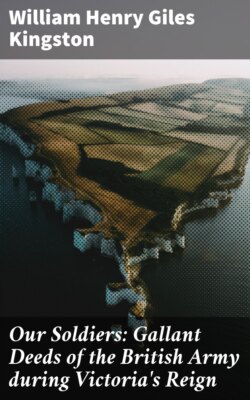Читать книгу Our Soldiers: Gallant Deeds of the British Army during Victoria's Reign - William Henry Giles Kingston - Страница 16
На сайте Литреса книга снята с продажи.
Forcing the Khyber Pass—5th April 1842.
ОглавлениеMeanwhile, when the news reached India that a British army had been destroyed in Afghanistan, and that General Sale, with another, was closely besieged in Jellalabad, a strong force was despatched under General Pollock to his relief. General Pollock had to encounter many difficulties in his march, but the greatest was forcing the Khyber Pass, which was known to be guarded by a numerous, active, and daring enemy. The troops had arrived at Jumrood, on the east end of the pass—on the west end was Ali-Musjid. The hills on either side of the pass were rocky and precipitous, presenting great obstacles to troops, guarded as they were by numerous bodies of Afridis, long accustomed to warfare. The difficulties were great, but they were known, and General Pollock prepared to surmount them. Brigadier Wild was in command of the advance guard, and General McCaskill of the rear.
Before dawn on the 5th of April Pollock’s force set out from Jumrood to the entrance of the Khyber Pass. It was formed of eight regiments of infantry, among whom were the 9th Queen’s Regiment, three cavalry corps, including two squadrons of the 3rd Dragoons, artillery, and sappers, in all some 8000 men. Brigadier Wild was in command of the advance guard and General McCaskill of the rear. The arrangement of the march was that the heights on either side should be occupied by infantry, the right being under the command of Colonel Taylor, and the left of Colonel Morley; and while these advanced along the heights the main column was to advance through the pass.
At three o’clock in the morning the army commenced its march. It moved off in the dim twilight without beat of drum or sound of bugle. The crowning columns moved off to the right and left, and commenced in silence to climb the heights, which were covered with the enemy; but so little did they expect that mode of attack, that the flankers had ascended a considerable distance before the Khyberees were aware of their advance. Daylight soon revealed the respective positions of the contending forces, and the struggle commenced.
The hillmen had thrown up across the pass a formidable barricade, composed of stones, mud, and branches of trees. Behind this barrier the enemy were gathered in force, waiting the opportunity to attack the main column when it should attempt the pass. But this opportunity did not come, for the main column on entering the pass halted in battle array, while the infantry on the hills performed the duty assigned to them of clearing the heights.
The left column was soon actively engaged; the right could not at first surmount the heights, from their precipitous character; but Colonel Taylor and his men, not to be defeated, stole round the base of the mountain unseen, and found a more practicable ascent than that they had at first tried. “Then on both sides the British infantry were soon hotly engaged with the mountaineers, clambering up the precipitous peaks, and pouring down a hot and destructive fire upon the surprised and disconcerted Khyberees, who had not expected that our disciplined troops would be more than a match for them on their native hills. But so it was. Our infantry, native and British, were beating them in every direction, and everywhere the white dresses of the Khyberees were seen as they fled across the hills.”
Now was the time for Pollock to advance. The centre column did not attempt to move forward until the flankers had fought their way to the rear of the mouth of the pass. But when he had fairly turned the enemy’s position, he began to destroy the barriers, and prepared to advance into the pass. The enemy had assembled in large numbers at the mouth; but finding themselves outflanked, they gradually withdrew, and without opposition Pollock now cleared his way through the barricade, and pushed into the pass with his long string of baggage. The great extent of his convoy was his chief difficulty for the rest of the day.
The march to Ali-Musjid occupied the greater part of the day. The heat was intense. The troops suffered greatly from thirst, but they all did their duty well. During the night, in spite of the bitter cold, the heights were held, and the enemy, who were constantly firing on the troops, kept in check. From thence the march was without incident, and the head of the column marched into Jellalabad unresisted on the 13th, a fortnight after the gallant sortie by which the garrison had freed themselves of Akbar Khan and his army.
